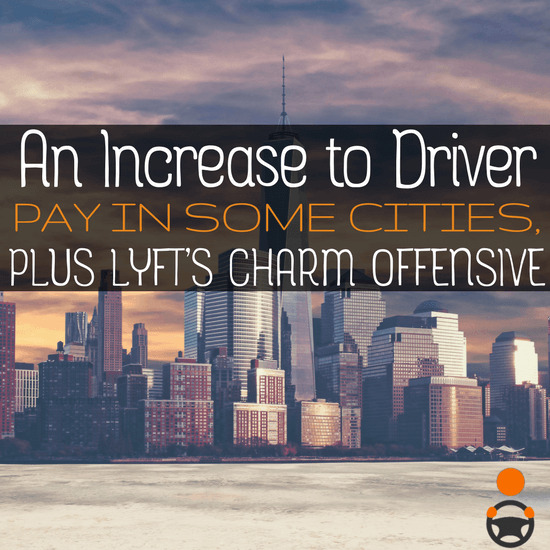Plenty of interesting news in the rideshare and shared mobility services world this week! Senior RSG contributor John Ince covers how Lyft is expanding its subscription services, Seattle is considering boosting rates for drivers and how shared mobility services are heating up.
Lyft president John Zimmer on self-driving cars and why his company is “better than Uber” [CBS News]
Sum and Substance: The president of ride-sharing company Lyft said Tuesday the deadly crash in Arizona involving an Uber self-driving SUV could have been prevented.
As Lyft continues trials of its own autonomous vehicles, its co-founder and president John Zimmer joined “CBS This Morning” to discuss how his own unique background influences the company’s direction and what sets them apart from their main competitor….
Changing the way cities operate is part of the reason Zimmer believes Lyft is superior to its biggest competition.
“Lyft is better than Uber because we care about improving our cities. We care about improving people’s lives and we care about the people that are behind the business,” Zimmer said.
My Take: Lyft CEO John Zimmer is attempting to frame their competition with Uber as the good guy vs. bad guys, and that certainly fits the prevailing narrative in the media. But I’m not so sure it fits the reality of the situation.
I see Uber and Lyft as essentially the same type company, with minor cosmetic differences. With Uber CEO Dara Khosrowshahi taking the reins from former Uber CEO Travis Kalanick, and a purge of many of TK’s protégées, the cultural differences between the two companies are even less pronounced.
They both have essentially the same business model – and many of the same drivers. They’re both losing money. They both treat drivers as commodities. Lyft may be more adept at managing their PR message, but that doesn’t mean they’re a better company. What do you think? Is Lyft a better company than Uber?
Lyft Expands Subscription Ride-Hailing Test to Dozens of Cities [Bloomberg]
Sum and Substance: Lyft Inc. is testing a subscription service in more than two dozen cities, hoping to lock in customers as competition with Uber Technologies Inc. heats up in the U.S. In recent weeks, the San Francisco-based company began experimenting with a variety of subscription packages, now available in 30 markets. Lyft President John Zimmer said he sees subscriptions as the future of his business.
“Eventually, the majority of miles traveled in the United States will be on a network like Lyft,” Zimmer said in an interview on Bloomberg TV’s “Studio 1.0,” which airs Wednesday night. “You’ll be subscribing to a Lyft transportation plan similar to how you have a music program, maybe Spotify, or a minutes plan like you have on AT&T or Verizon.”…
Uber is also experimenting with subscriptions. Charging by the month instead of per ride discourages customers from shopping between Uber and Lyft for the best price and can build loyalty to a single service.
My Take: As Lyft continues to bleed red ink, they need to come up with a plausible narrative on how they’re eventually going to turn a profit.
Here, it appears that Lyft CEO is placing the emphasis on subscriptions. I don’t buy it. Lyft (and Uber) are not Spotify. Ridesharing companies offer a service through an entirely different medium than Spotify, Netflix or any other subscription company. Streaming music is a whole different ball game than hailing a ride.
Moreover, the subscription plans Lyft is offering (ranging from $199 for 30 rides to $399 for 60 rides) seem to be just another disguised form of a price cut – which will put Lyft further in the red. Perhaps, with the success of Spotify’s IPO this week, what John Zimmer really wants to conjure up is the notion that like Spotify, Lyft can sell their shares to public markets even though they’ve never even come close to turning a profit.
Seattle considers raising rates for Uber and Lyft rides to boost driver compensation [Geekwire]
Sum and Substance: The Seattle City Council is expected to introduce a resolution this week to start the process toward enacting new regulations that could change how on-demand transportation companies operate in the region. The city will explore a minimum base fare of $2.40 per ride for Uber and Lyft and a minimum compensation for all independent contractors, which includes drivers for transportation networks.
Both companies already have base fares of $1.35 in Seattle. Uber is responding to the resolution with a show of force. The company launched a petition against the proposed changes and emailed it to Seattle-area Uber riders Monday. The petition exceeded its goal of 5,000 signatures within a few hours. Uber says that the City Council intends to go beyond the minimum fare outlined in the resolution by increasing the per-mile rate, based on early discussions…
Nationally, the actual compensation for Uber and Lyft drivers is in dispute. A study by MIT researchers found that drivers’ median pre-tax profit was $3.37 per hour. Uber CEO Dara Khosrowshahi publicly challenged the methodology of the study as flawed and its lead researcher told Reuters he intends to re-run the analysis…
My Take: Seattle’s city council has been at the forefront of the justice movement for drivers and this initiative, if enacted, would set a precedent that could have national implications. Uber, predictably, is fighting tooth and nail against what seems to me to be an eminently reasonable proposal. Again, it all comes down to the numbers, and that’s why Uber reacted so swiftly against the MIT study a few weeks back.
JUMP Bikes weighing Uber $100m+ acquisition, investment offers [TechCrunch]
Sum and Substance: JUMP Bikes, the on-demand biking service that integrates with Uber, has been weighing both acquisition and investment offers. A decision has not yet been reached, but right now possible options include a sale to Uber at a price that exceeds $100 million, or a venture investment round, multiple sources tell TechCrunch.
One of the possible investor names that has been floated is Mike Moritz of Sequoia Capital, but we are told that JUMP has several options. We are also told that various parties have been upping their offers over the past week, as they fiercely compete to get ownership of JUMP.
“E-bikes” are expected to become more popular, where users are able to find and rent bikes quickly via apps. They are part regular bike and part electric, which makes it easier to go up hills.JUMP launched as Social Bicycles nearly a decade ago, but the startup recently rebranded as JUMP when it announced its $10 million Series A investment round a few months back. Menlo Ventures and Sinewave Ventures invested.
Since then, JUMP has launched a partnership with Uber, available in select cities like San Francisco and Washington, D.C. Users are able to identify a nearby bike via the Uber app and are given a PIN to unlock it. They do not require bike docks, meaning they can be picked up and dropped off everywhere. It costs $2 for every 30 minutes.
My Take: E-bikes is a hot new investment category with good reason. Ebikes make environmental sense. They also make sense from a traffic congestion perspective, and heck, they’re a lot of fun as long as you don’t get in an accident.
If Michael Moritz of Sequoia Capital is interested, you know this is a serious investment category. Moritz bet big on Google and many of Silicon Valley’s biggest hits. Don’t expect JUMP to be another Google, but e-bikes are going to be a hit, if the company can just solve the logistical problems.
Bird’s Challenge To Rivals Shows The Micro-Mobility Wars Have Begun [Forbes]
Sum and Substance: The feel-good world of shared electric micro-mobility is apparently going to be as cutthroat as any other sector of the new transportation economy.
Bird, a purveyor of shared electric scooters, released dozens of the two-wheeled, rentable devices on the sidewalks of San Jose and San Francisco on March 27, adding those cities to existing Bird locations in Washington D.C., San Diego and West Los Angeles.
The Santa Monica-based startup has ambitions to grow its presence to as many as 50 cities and, thanks to a validated business model and $100 million in Series B funding, has the capital to do it…
Editor’s Note: A pretty long article on Bird and what’s going on behind the scenes for shared mobility. If you’re curious about Bird, and the future of “micro-mobility”, check out this article.
Curious how Bird works? Check out this video on Bird below!
Readers, what do you think of this week’s round up?
-John @ RSG





